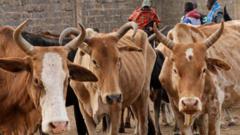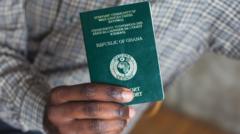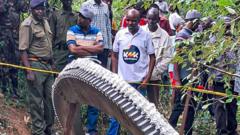Farmers remain skeptical despite assurances as vaccination program seeks to boost livestock health and export eligibility.
**Tensions Surge in Kenya Over Controversial Livestock Vaccination Initiative**

**Tensions Surge in Kenya Over Controversial Livestock Vaccination Initiative**
Community Resistance Stifles Government Efforts Amid Conspiracy Theories
In an attempt to vaccinate the country's livestock, the Kenyan government faces an escalating backlash from farmers amid rampant conspiracy theories and misinformation about the vaccines. The initiative, aimed at vaccinating over 22 million cattle and 50 million goats and sheep over three years, has prompted mixed reactions from the agricultural community, predominantly due to fears surrounding foreign interference and vaccine safety.
The government has assured farmers that there will be no cost involved, instigating skepticism from many within the farming community. Robert Nkukuu, a farmer from Nakuru county, voiced the prevailing sentiment in his locality, stating, "If you're supportive of vaccinations, you will face severe backlash from your community." This response ramps up tension that has brewed since President William Ruto announced the strategy last November.
Currently, only 10% of livestock in Kenya are vaccinated against diseases such as foot-and-mouth and peste des petits ruminants (PPR), a situation the government aims to improve significantly with the proposed initiative, vital for gaining access to export markets. The program aims to increase vaccination rates to 85% within three years. However, skepticism remains high, fueled by unsubstantiated claims that high-profile figures, like Microsoft co-founder Bill Gates, are financing the vaccination campaign, largely propelled by misleading social media posts.
Agriculture ministry officials have dispelled rumors regarding Gates' involvement but struggle against a tide of conspiracy theories suggesting the vaccines could alter livestock genetics or introduce potential harm. Criticism from opposition leaders has compounded this distrust, with some viewing the initiative as a foreign agenda. Critics allege that the lack of transparency regarding vaccination details is a significant barrier to trust.
The fallout has elevated tensions in an already strained economic environment for farmers, as previous tax increases under Ruto's administration have left many feeling marginalized. Analysts point to insufficient communication from the government, which has hindered public understanding and trust in the vaccine program. With increasing public dissent and even humorous social media trends mocking the situation, those in leadership roles from the Kenya Veterinary Association to agriculture ministry officials are calling for a more concerted public education effort.
As the vaccination campaign looms, farm owners like David Tiriki in Kajiado county express profound mistrust. "It seems there is a hidden motive to introduce a virus so that the wealthy can sell treatments to impoverished farmers," he remarked. Nonetheless, some small-scale farmers see potential benefits from the initiative while stressing the importance of transparency and reassurance to mitigate fears regarding vaccine safety.
Experts underscore the criticality of mass vaccination in preventing outbreaks of diseases like foot-and-mouth disease, which have already prompted market closures and quarantine measures. With the window for effective action closing, government officials assert the need to pursue vaccination despite significant public hesitation—an endeavor increasingly complicated by ongoing mistrust and conspiracy theories within the farming community.
The government has assured farmers that there will be no cost involved, instigating skepticism from many within the farming community. Robert Nkukuu, a farmer from Nakuru county, voiced the prevailing sentiment in his locality, stating, "If you're supportive of vaccinations, you will face severe backlash from your community." This response ramps up tension that has brewed since President William Ruto announced the strategy last November.
Currently, only 10% of livestock in Kenya are vaccinated against diseases such as foot-and-mouth and peste des petits ruminants (PPR), a situation the government aims to improve significantly with the proposed initiative, vital for gaining access to export markets. The program aims to increase vaccination rates to 85% within three years. However, skepticism remains high, fueled by unsubstantiated claims that high-profile figures, like Microsoft co-founder Bill Gates, are financing the vaccination campaign, largely propelled by misleading social media posts.
Agriculture ministry officials have dispelled rumors regarding Gates' involvement but struggle against a tide of conspiracy theories suggesting the vaccines could alter livestock genetics or introduce potential harm. Criticism from opposition leaders has compounded this distrust, with some viewing the initiative as a foreign agenda. Critics allege that the lack of transparency regarding vaccination details is a significant barrier to trust.
The fallout has elevated tensions in an already strained economic environment for farmers, as previous tax increases under Ruto's administration have left many feeling marginalized. Analysts point to insufficient communication from the government, which has hindered public understanding and trust in the vaccine program. With increasing public dissent and even humorous social media trends mocking the situation, those in leadership roles from the Kenya Veterinary Association to agriculture ministry officials are calling for a more concerted public education effort.
As the vaccination campaign looms, farm owners like David Tiriki in Kajiado county express profound mistrust. "It seems there is a hidden motive to introduce a virus so that the wealthy can sell treatments to impoverished farmers," he remarked. Nonetheless, some small-scale farmers see potential benefits from the initiative while stressing the importance of transparency and reassurance to mitigate fears regarding vaccine safety.
Experts underscore the criticality of mass vaccination in preventing outbreaks of diseases like foot-and-mouth disease, which have already prompted market closures and quarantine measures. With the window for effective action closing, government officials assert the need to pursue vaccination despite significant public hesitation—an endeavor increasingly complicated by ongoing mistrust and conspiracy theories within the farming community.


















